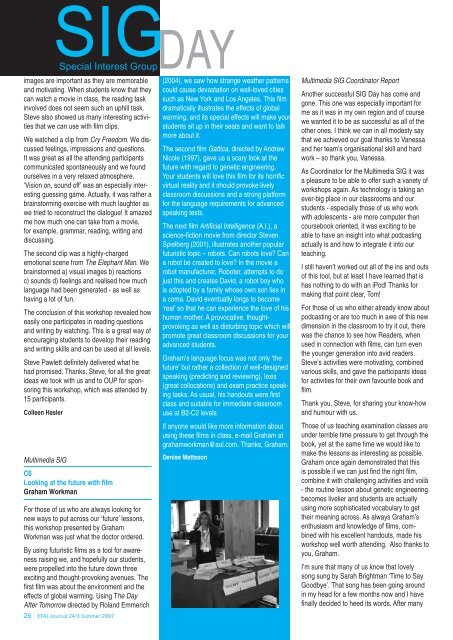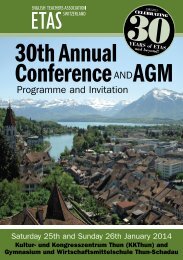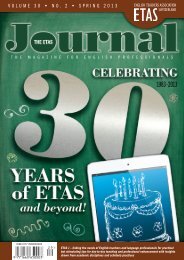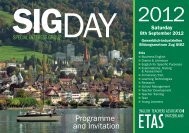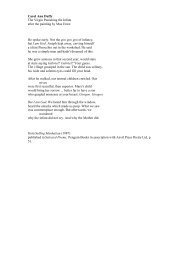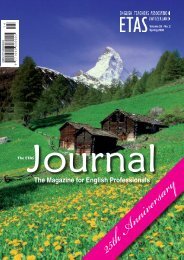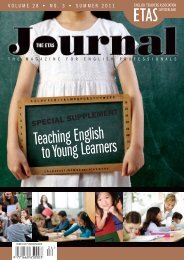The Magazine for English Professionals - English Teachers ...
The Magazine for English Professionals - English Teachers ...
The Magazine for English Professionals - English Teachers ...
You also want an ePaper? Increase the reach of your titles
YUMPU automatically turns print PDFs into web optimized ePapers that Google loves.
SIGDAY<br />
Special Interest Group<br />
images are important as they are memorable<br />
and motivating. When students know that they<br />
can watch a movie in class, the reading task<br />
involved does not seem such an uphill task.<br />
Steve also showed us many interesting activities<br />
that we can use with film clips.<br />
We watched a clip from Cry Freedom. We discussed<br />
feelings, impressions and questions.<br />
It was great as all the attending participants<br />
communicated spontaneously and we found<br />
ourselves in a very relaxed atmosphere.<br />
‘Vision on, sound off’ was an especially interesting<br />
guessing game. Actually, it was rather a<br />
brainstorming exercise with much laughter as<br />
we tried to reconstruct the dialogue! It amazed<br />
me how much one can take from a movie,<br />
<strong>for</strong> example, grammar, reading, writing and<br />
discussing.<br />
<strong>The</strong> second clip was a highly-charged<br />
emotional scene from <strong>The</strong> Elephant Man. We<br />
brainstormed a) visual images b) reactions<br />
c) sounds d) feelings and realised how much<br />
language had been generated - as well as<br />
having a lot of fun.<br />
<strong>The</strong> conclusion of this workshop revealed how<br />
easily one participates in reading questions<br />
and writing by watching. This is a great way of<br />
encouraging students to develop their reading<br />
and writing skills and can be used at all levels.<br />
Steve Pawlett definitely delivered what he<br />
had promised. Thanks, Steve, <strong>for</strong> all the great<br />
ideas we took with us and to OUP <strong>for</strong> sponsoring<br />
this workshop, which was attended by<br />
15 participants.<br />
Colleen Hasler<br />
Multimedia SIG<br />
C6<br />
Looking at the future with film<br />
Graham Workman<br />
For those of us who are always looking <strong>for</strong><br />
new ways to put across our ‘future’ lessons,<br />
this workshop presented by Graham<br />
Workman was just what the doctor ordered.<br />
By using futuristic films as a tool <strong>for</strong> awareness<br />
raising we, and hopefully our students,<br />
were propelled into the future down three<br />
exciting and thought-provoking avenues. <strong>The</strong><br />
first film was about the environment and the<br />
effects of global warming. Using <strong>The</strong> Day<br />
After Tomorrow directed by Roland Emmerich<br />
26 ETAS Journal 24/3 Summer 2007<br />
(2004), we saw how strange weather patterns<br />
could cause devastation on well-loved cities<br />
such as New York and Los Angeles. This film<br />
dramatically illustrates the effects of global<br />
warming, and its special effects will make your<br />
students sit up in their seats and want to talk<br />
more about it.<br />
<strong>The</strong> second film Gattica, directed by Andrew<br />
Nicole (1997), gave us a scary look at the<br />
future with regard to genetic engineering.<br />
Your students will love this film <strong>for</strong> its horrific<br />
virtual reality and it should provoke lively<br />
classroom discussions and a strong plat<strong>for</strong>m<br />
<strong>for</strong> the language requirements <strong>for</strong> advanced<br />
speaking tests.<br />
<strong>The</strong> next film Artificial Intelligence (A.I.), a<br />
science-fiction movie from director Steven<br />
Spielberg (2001), illustrates another popular<br />
futuristic topic – robots. Can robots love? Can<br />
a robot be created to love? In the movie a<br />
robot manufacturer, Roboter, attempts to do<br />
just this and creates David, a robot boy who<br />
is adopted by a family whose own son lies in<br />
a coma. David eventually longs to become<br />
‘real’ so that he can experience the love of his<br />
human mother. A provocative, thoughtprovoking<br />
as well as disturbing topic which will<br />
promote great classroom discussions <strong>for</strong> your<br />
advanced students.<br />
Graham’s language focus was not only ‘the<br />
future’ but rather a collection of well-designed<br />
speaking (predicting and reviewing), lexis<br />
(great collocations) and exam practice speaking<br />
tasks. As usual, his handouts were first<br />
class and suitable <strong>for</strong> immediate classroom<br />
use at B2-C2 levels.<br />
If anyone would like more in<strong>for</strong>mation about<br />
using these films in class, e-mail Graham at<br />
grahamworkman@aol.com. Thanks, Graham.<br />
Denise Mattsson<br />
Multimedia SIG Coordinator Report<br />
Another successful SIG Day has come and<br />
gone. This one was especially important <strong>for</strong><br />
me as it was in my own region and of course<br />
we wanted it to be as successful as all of the<br />
other ones. I think we can in all modesty say<br />
that we achieved our goal thanks to Vanessa<br />
and her team’s organisational skill and hard<br />
work – so thank you, Vanessa.<br />
As Coordinator <strong>for</strong> the Multimedia SIG it was<br />
a pleasure to be able to offer such a variety of<br />
workshops again. As technology is taking an<br />
ever-big place in our classrooms and our<br />
students - especially those of us who work<br />
with adolescents - are more computer than<br />
coursebook oriented, it was exciting to be<br />
able to have an insight into what podcasting<br />
actually is and how to integrate it into our<br />
teaching.<br />
I still haven’t worked out all of the ins and outs<br />
of this tool, but at least I have learned that is<br />
has nothing to do with an iPod! Thanks <strong>for</strong><br />
making that point clear, Tom!<br />
For those of us who either already know about<br />
podcasting or are too much in awe of this new<br />
dimension in the classroom to try it out, there<br />
was the chance to see how Readers, when<br />
used in connection with films, can turn even<br />
the younger generation into avid readers.<br />
Steve’s activities were motivating, combined<br />
various skills, and gave the participants ideas<br />
<strong>for</strong> activities <strong>for</strong> their own favourite book and<br />
film.<br />
Thank you, Steve, <strong>for</strong> sharing your know-how<br />
and humour with us.<br />
Those of us teaching examination classes are<br />
under terrible time pressure to get through the<br />
book, yet at the same time we would like to<br />
make the lessons as interesting as possible.<br />
Graham once again demonstrated that this<br />
is possible if we can just find the right film,<br />
combine it with challenging activities and voilà<br />
- the routine lesson about genetic engineering<br />
becomes livelier and students are actually<br />
using more sophisticated vocabulary to get<br />
their meaning across. As always Graham’s<br />
enthusiasm and knowledge of films, combined<br />
with his excellent handouts, made his<br />
workshop well worth attending. Also thanks to<br />
you, Graham.<br />
I’m sure that many of us know that lovely<br />
song sung by Sarah Brightman ‘Time to Say<br />
Goodbye’. That song has been going around<br />
in my head <strong>for</strong> a few months now and I have<br />
finally decided to heed its words. After many


